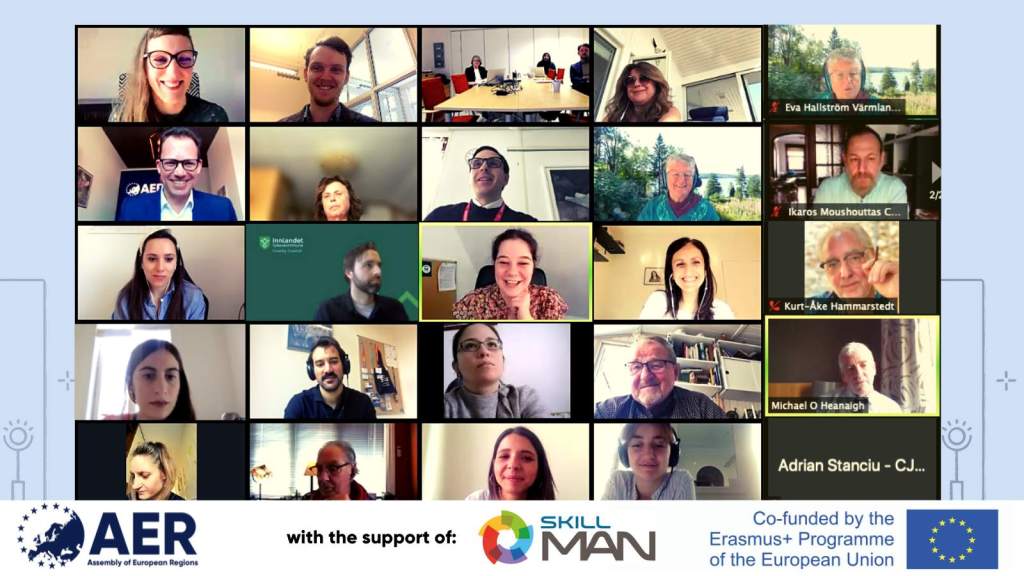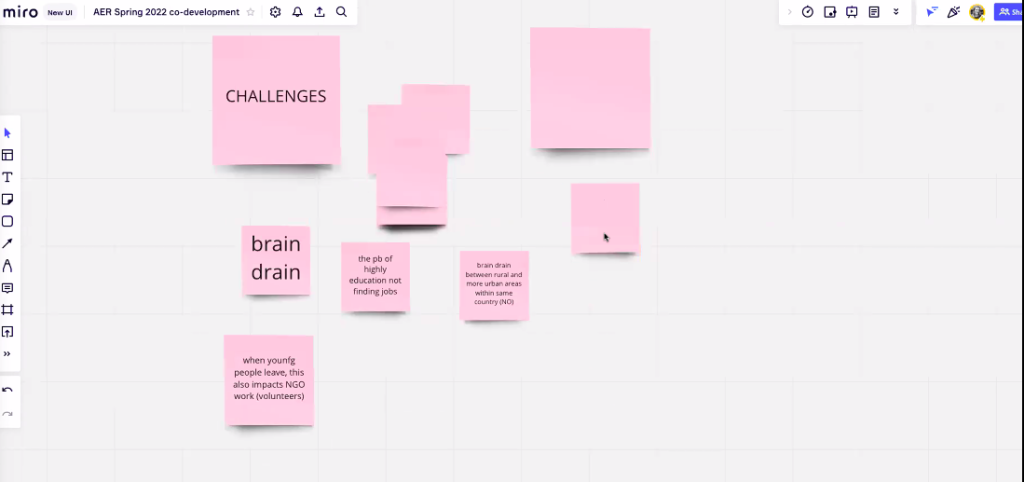 Share this!
Share this!Last week, the AER held its virtual Spring meetings. From sharing ideas for collaboration in our working groups, to reaffirming our political priorities in our Bureau, these meetings showed the value of bringing members together to meet new challenges and shape our common future.
The day began with an energetic and fruitful brainstorming session on the AER action plan led by Policy & Knowledge Transfer Coordinator, Johanna Pacevicius. This was a chance for members to share perspectives on the priorities for their regions and find areas of common interest for the work of AER. Members from Innlandet to Ireland shared approaches to addressing common challenges, for example, reversing brain-drain from rural areas through setting up remote-working hubs to draw young, highly-skilled people back to these peripheral regions, and how a place-based approach to the bioeconomy and sustainable tourism can help regions make the green transition work from an economic, social and environmental perspective. Members who are interested in getting involved in or learning more about our Working Groups should contact Johanna Pacevicius HERE.

Growth, Jobs and Investment—no Recovery without our Regions
The second part of the day was dedicated to the AER’s political work, which has continued in earnest since two new Task Forces were created in late 2021.
Of course, all things are overshadowed by the ongoing war in Ukraine, which was noted by AER President Magnus Berntsson and Vice President, Lukas Mandl in their contributions at the opening of the Bureau meeting. The ongoing work of AER members in providing humanitarian support to Ukraine was noted by participants, with Secretary General, Christian Spahr, underlining that the AER Secretariat “is always happy to share information on how members can help the members in Ukraine.” [more information in our article HERE].
Turning to the recovery, the President welcomed participants to the Bureau debate on Growth, Investment & Jobs by stressing the need for territorial approach, “To build economic strength we must have input from local & regional authorities, & better aligned investments reflecting the specific needs of our territories.”
This lively debate welcomed participants from AER member regions, the OECD, the European Parliament, Commission and Committee of the Regions. What became clear in all contributions was how essential it is for regions to have a role in the recovery.
But why? Because regions “play a crucial role in supporting economic growth and have the knowledge of the real needs of their territories,” explained AER Vice President Alessandra Zedda. This hypothesis was supported by Karen Maguire, Head of the OECD’s Local Employment, Skills and Social Innovation Division, who pointed to regions’ ability to make targeted investments to boost growth. She noted that SMEs—the backbone of Europe’s labour market—have struggled with debt and productivity as a result of the pandemic, and in this context “local and regional action in terms of investments can be particularly effective” in helping them bounce back. Taking a a broader view, Chair of the European Parliament’s Employment and Social Affairs Committee, Dragoş Pîslaru stressed that there can be no recovery without input from regions, who are “crucial to changing our lives for the better after all the challenges and crises we face”.
Several AER member regions shared insights on how and in what sectors such “smart” investments can make a real impact. AER Vice President Albert Castellanos explained how Catalonia (ES) region has identified 27 strategic projects in high-tech, growth areas like green hydrogen, electric vehicles and microchip production to transform their economy. Similarly, Vice President Mícheál Ó hÉanaigh highlighted how pre-covid investments in remote working hubs have helped Irish-speaking “Gaeltacht” regions attract young talent from cities to rural areas. Improving technical and vocational education and training (TVET)—where there remains a labour shortage despite demand—is another area where regions can make an impact, as noted by Maria Elena Romanini, a TVET expert who presented AER’s Skillnet Project as a best practice in this field.
The European Union has stepped up to the plate to support such investments; mobilising unprecedented sums—more than €800 billion—to finance the recovery through its Next Generation EU programme. European Commission expert, David Lopes, explained how there are €200 million euro worth of grants from the Recovery and Resilience Facility (RRF) remaining to ensure a green and digital recovery from the pandemic.
Yet, despite these opportunities, there remain serious challenges for regions looking to make the best of instruments like the RRF, as noted by Cllr. Michael Murphy, Chair of the Commission for Economic Policy, European Committee of the Regions, “much work remains to be done when it comes to ensuring coordination and reducing competition with structural funds”. The AER will continue to push for local and regional authorities to have a real say in how recovery funds are invested to ensure a resilient, fair and green recovery for all of Europe.
Democracy, Sustainable Mobility & Connectivity—Regions shaping the Future of Europe
The second half of the Bureau was dedicated to adopting several position papers and setting political priorities.
With the Conference on the Future of Europe coming to a close this May 2022, the Bureau continues to push for greater regional involvement in political decision-making, thereby strengthening the voices of our citizens, as explained by Nina Björby, AER Vice President for Democracy. The vital work of the AER in promoting good governance and citizens’ participation resulted in the adoption of two complimentary position papers during the meeting; these new position papers covering “Recommendations on the Future of Europe” and “Democracy” can be viewed HERE and HERE.
The road to recovery is paved with sustainable transport infrastructure, and the AER’s Task Force on Sustainable Mobility & Connectivity has continued to ‘drive’ work on the ground to encourage uptake of sustainable mobility systems that serve environmental, social and economic ambitions in our regions. You can read the newly adopted position paper HERE.
Join our New Task Force on Youth!
Finally, in light of the European Year of Youth, the AER Bureau, led by its Vice President Mícheál Ó hÉanaigh has decided to set up a dedicated Task Force on Youth. With this Task Force, AER will join the discussions on Europe’s next generation in the context of the European Year, working to ensure the recovery reaches young people, a group who were disproportionately impacted by the pandemic.
If youth is a priority for your region, you can get involved in the Task Force by checking out our article HERE.
Organised with the support of:

